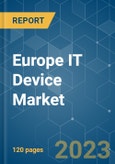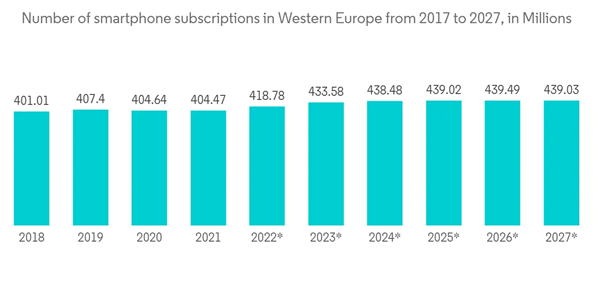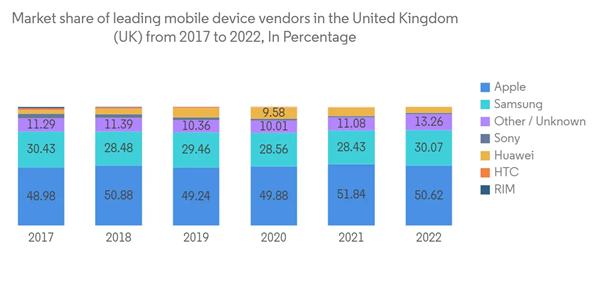Key Highlights
- HP Inc. and Lenovo are the industry leaders in the European PC hardware market, holding a combined market share of almost 50%. Other well-known manufacturers include Dell, Acer, Asus, and Apple. HP Inc. and Lenovo again hold around half of the market when focusing only on PC shipments in Western Europe. In terms of tablet devices, Apple and Samsung are the top two providers in the European area, with Lenovo, Huawei, and Microsoft also prominent. As a result, Android and iOS are the operating systems that power over 90% of the region's tablet market.
- Nowadays, mobile phones are used almost everywhere in everyday life.When compared to laptops and notebooks, portable devices are used more frequently to connect to the internet. Mobile devices have largely replaced conventional items like watches and alarm clocks in Sweden, Denmark, and Norway as a tool for necessities like telling the time, setting the alarm, and taking pictures. Similar trends may be seen in the United Kingdom, where electronic device usage is strong, especially for computers, smartphones, and mobile phones.
- Inflation is difficult to ignore, especially given some forecasts that it could reach nearly 18% early next year, and it is already affecting people in the PC device industry. The effects of both inflationary pressures and the continued Chinese shipment challenges were evident from a review of PC shipments across Western Europe in the second quarter. In general, inflation has gone up across Europe, which is making people think twice as they prepare for a possible pay cut.
- Last year, there were more than 62 million smartphone users in Germany, making it a significant market for smartphone manufacturers. An estimated figure of nearly 20 million cell phones were sold nationwide in the current year. Approximately 75.6 million individuals are anticipated to own smartphones in Germany by 2024. As of January this year, Apple and Samsung had the highest smartphone share in the country.
- Due to the region's flexibility in responding to COVID, Western Europe has been a steadfast market for PC makers over the past two years. Although the PC shipment fell slightly from the current year's first quarter, it is still higher than the pre-pandemic level. Commercial demand is high as several marketplaces formally transition to business as usual market for PC makers over the past two years. Although the PC shipment fell slightly from the current year's first quarter, it is still higher than the pre-pandemic level. Commercial demand is high as several marketplaces formally transition to business as usual. The year 2021 was surprising for the European smartphone market. Early indications were encouraging that the market was rebounding from a challenging time when the COVID-19 epidemic hit the region hard and caused problems on both the supply and demand sides. Consequently, while the European smartphone market did increase by approximately 8% in the last year, this was only a partial recovery.
Europe IT Device Market Trends
Smartphone Demand Boosting the Market
- The adoption of smartphones is also increasing across Europe. By the end of last year, smartphones accounted for four out of every five mobile connections in Europe. According to the GSMA report on the mobile economy in Europe in the current year, there was an 80% smartphone penetration rate in Europe last year, which is expected to rise to 84% in 2025. Also, by the end of 2025, the total number of mobile subscribers is expected to reach 480 million, adding 6 million subscribers between last year and 2025.
- Germany, the United Kingdom, and France are the three largest smartphone markets in Europe. Speedy coverage of internet networks and the accessibility of 5G connections are attributed to the region's demand for 5G-enabled smartphones. Germany and the United Kingdom are anticipated to have the leading 5G coverage across the region, i.e., 59% and 61%, respectively, by 2025.
- The breakdown of smartphone shipments in Europe by vendor shows that Samsung and Apple were the market leaders in the previous year's fourth quarter. Also, Xiaomi is gradually peaking its demand in the European market. It grew from 4% in the first quarter of 2019 to 24% in the second quarter of last year. Even if Samsung and Apple's combined market share in Europe has changed throughout the years, they still controlled more than half of the market in the fourth quarter of last year.
- With the robust growth in smartphone phone usage across the region, consumers are now utilizing their mobile devices, such as smartphones and tablets, to buy products and services, fueling the expansion of e-commerce. More people can now use m-commerce services because more people have access to and use the internet. This is helping the sector grow.
- According to an Ericsson report, Western Europe will have 439 million smartphone subscribers by 2027. Western Europe had over 404 million smartphone subscribers last year.
The United Kingdom Adds Substantially to the Market
In the United Kingdom, the laptop market will expand significantly in the next year. These portable gadgets have become quite popular due to their great degree of adaptability for usage in both professional and domestic settings. As a result of the coronavirus (COVID-19) epidemic, more people are now working or attending school from home. Investments were made in new computer hardware to make hybrid systems more effective and to create incredibly portable items like laptops and tablets.- Customers in the United Kingdom frequently choose Apple's range of MacBook devices, which fall into the more expensive price range of PCs on the market. As laptop brands commonly found in United Kingdom homes, Hewlett-Packard (HP), Acer, Lenovo, and Dell also score well. At nearly 27%, HP had the highest laptop ownership rate in the country.They are followed by Apple, Acer, and Dell, with 21%, 19%, and 19% shares in the market, respectively.
- Robust internet coverage in the country is attributed to the demand for smart devices like laptops, tablets, and smartphones. By 2025, 5G would account for nearly half of all mobile connections in Europe.That said, the number of 5G subscribers is expected to reach 45 million in the United Kingdom by 2025.
- Over the past two decades, the smartphone market in the United Kingdom has experienced rapid growth. The United Kingdom has the highest smartphone adoption rate in the whole region. According to the GSMA report, the country's smartphone adoption rate is expected to increase from 86% last year to 88% in 2026. Additionally, by the end of 2025, there will be 65 million smartphone connections in the United Kingdom.
- According to a StatCounter report, Apple has over 50% of the United Kingdom market for mobile devices in the current year, making it the market leader. Samsung finished second with a market share of nearly 30% in the United Kingdom. Both top suppliers were far superior to the remainder of the United Kingdom's mobile device manufacturers.
Europe IT Device Market Competitor Analysis
The Europe IT device market is highly fragmented, as it currently consists of many players. Several key market players are constantly working to bring advancements.A few prominent companies are entering into collaborations and are also expanding their global footprints in developing regions to consolidate their positions in the market. The major players in this market include Samsung, Motorola, Apple, Lenovo, and HP.In October 2022, Apple, walking in line with its prior commitment to become an entirely carbon emission-free business, declared that it would make new investments to establish wind and solar projects in Europe and urged its suppliers to decarbonize processes used in manufacturing iPhones and other goods.
In September 2022, Google disclosed that it was all set to launch the Pixel 7 series in a few more European cities. This invitation's web page reveals that it will be held in Copenhagen. Following the announcement that the Pixel 7 would debut in India, this would be the smartphone series' first formal expansion in Europe in a while.
Additional benefits of purchasing the report:
- The market estimate (ME) sheet in Excel format
- 3 months of analyst support
This product will be delivered within 2 business days.
Table of Contents
Companies Mentioned (Partial List)
A selection of companies mentioned in this report includes, but is not limited to:
- Apple Inc
- Microsoft Corporation
- Google LLC
- HP Inc.
- Dell Technologies
- Acer Group
- Lenovo Group Limited
- ASUSTek Computer Inc
- LG Corporation
- Samsung Electronics Co., Ltd.
- Xiaomi Corporation
- Huawei Technologies Co., Ltd.
- Guangdong Oppo Mobile Telecommunications Corp., Ltd
- Sony Corporation
- Nokia Corporation
- Motorola, Inc.










